Unit 6 Do you like bananas?(Section B 2a---2c)课件
文档属性
| 名称 | Unit 6 Do you like bananas?(Section B 2a---2c)课件 |
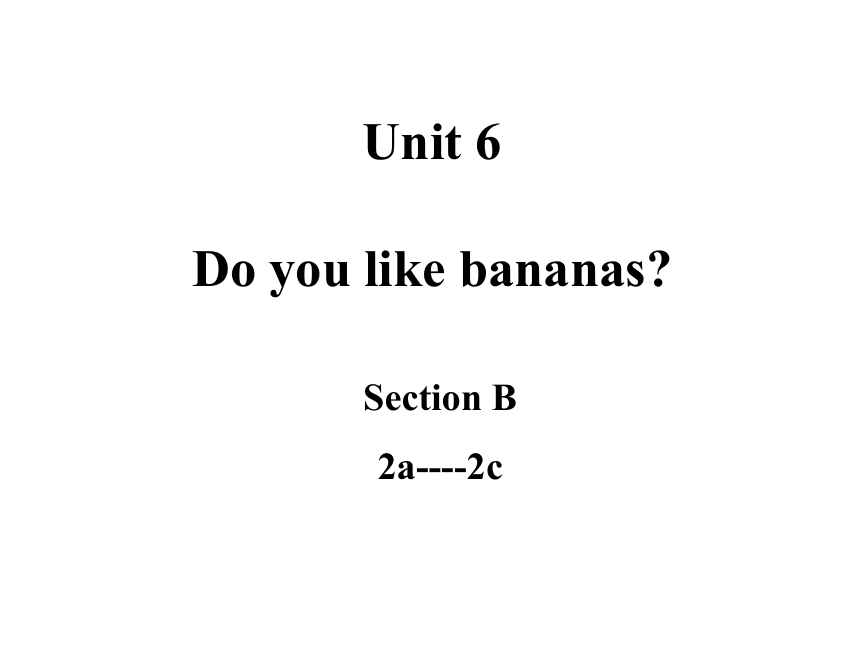
|
|
| 格式 | zip | ||
| 文件大小 | 879.3KB | ||
| 资源类型 | 教案 | ||
| 版本资源 | 人教新目标(Go for it)版 | ||
| 科目 | 英语 | ||
| 更新时间 | 2016-05-22 00:00:00 | ||
图片预览

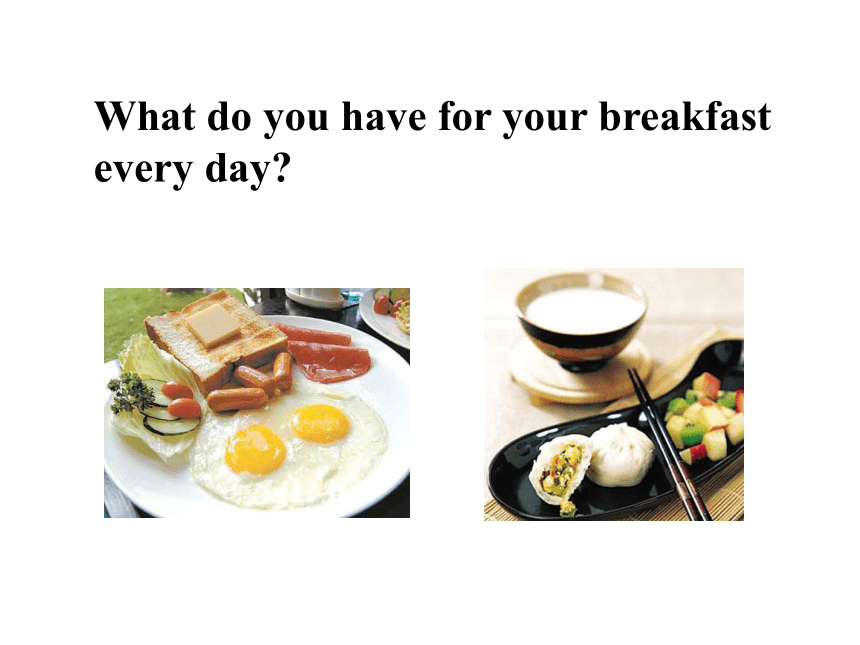
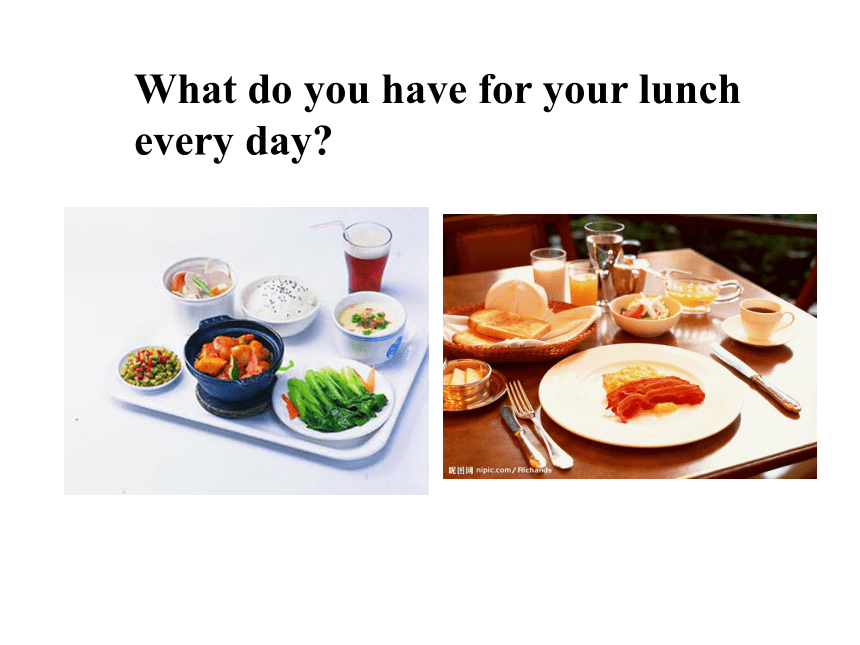
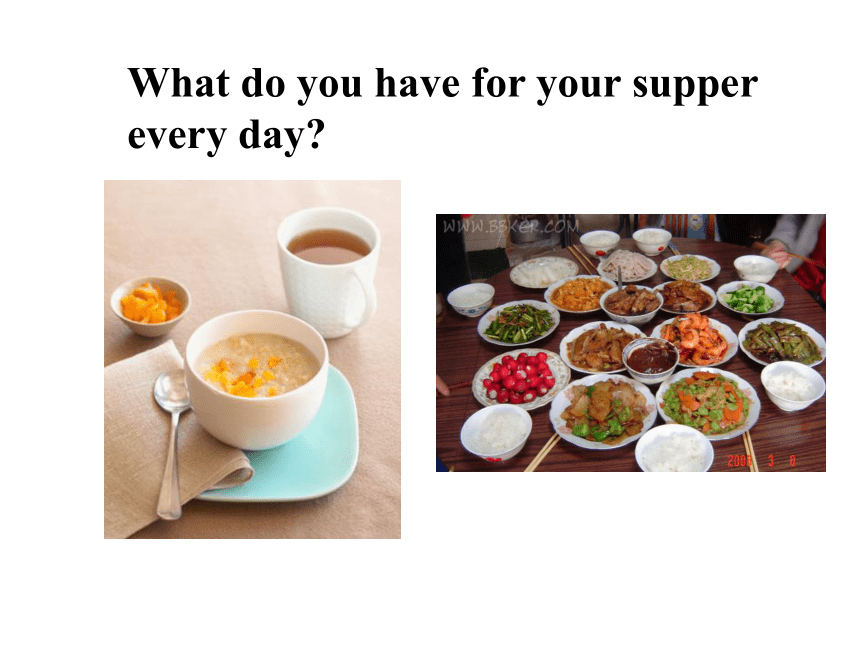
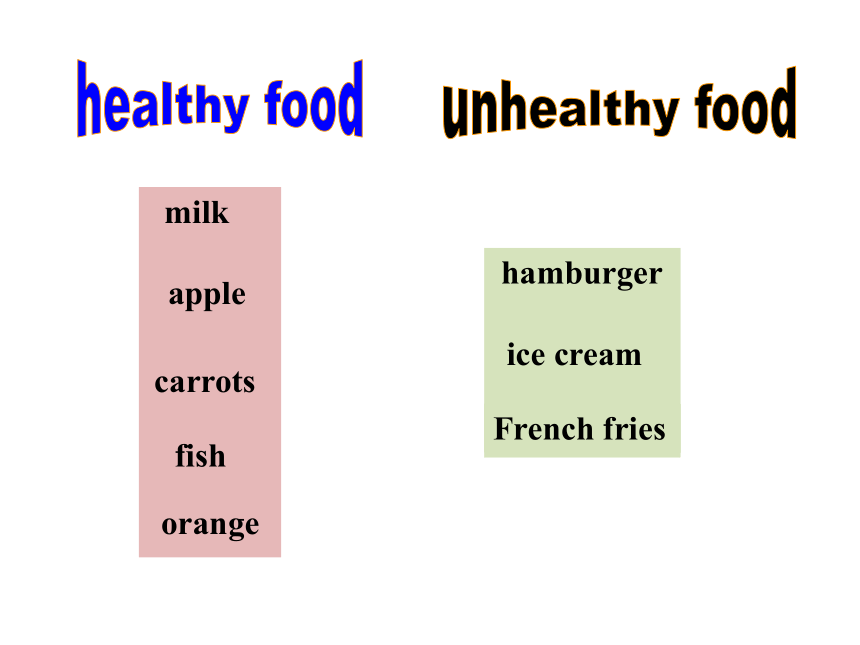
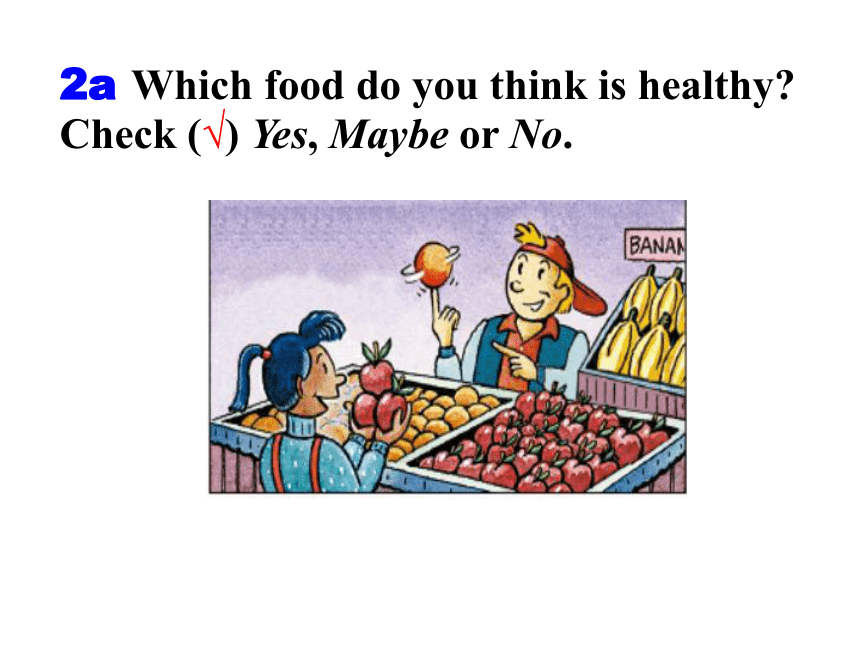

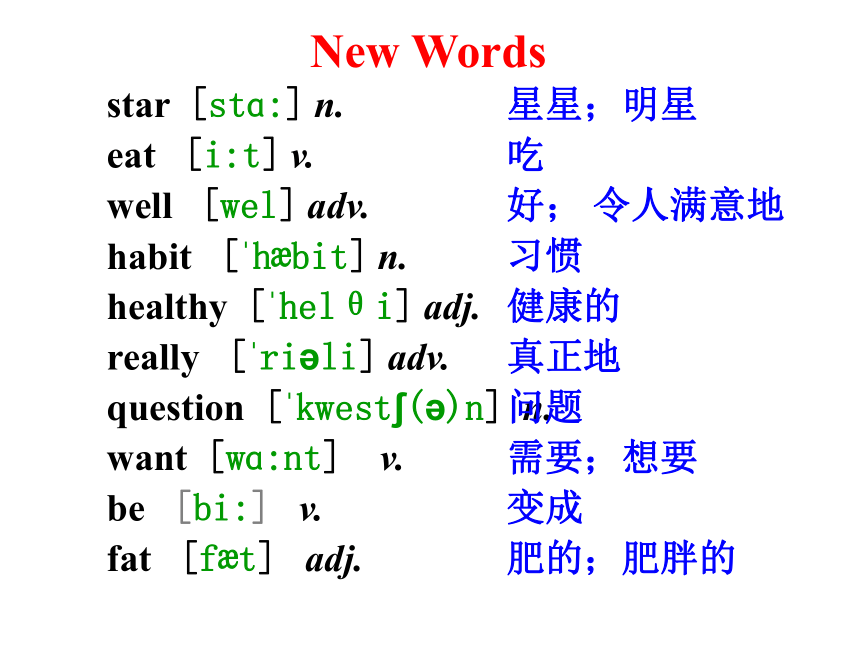
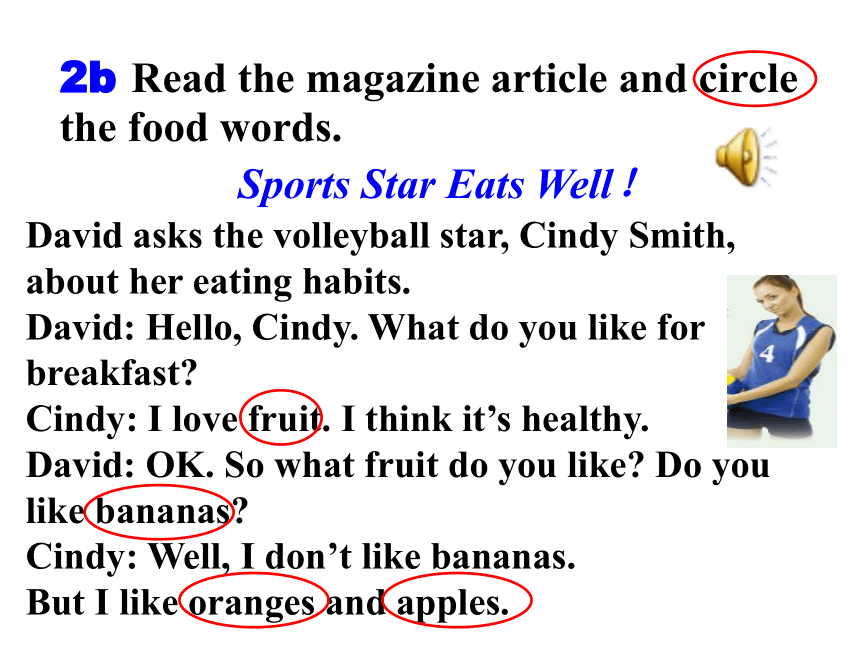
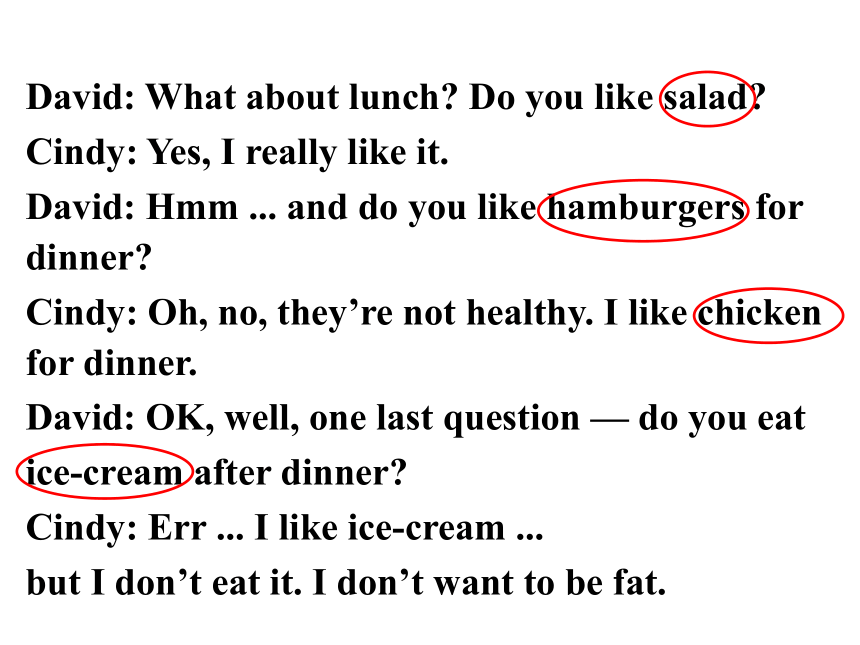
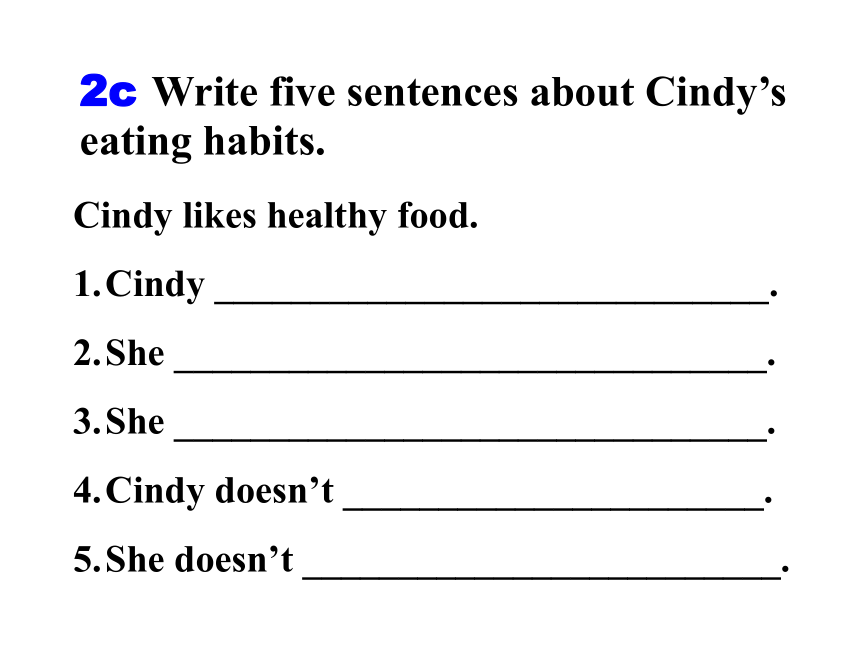
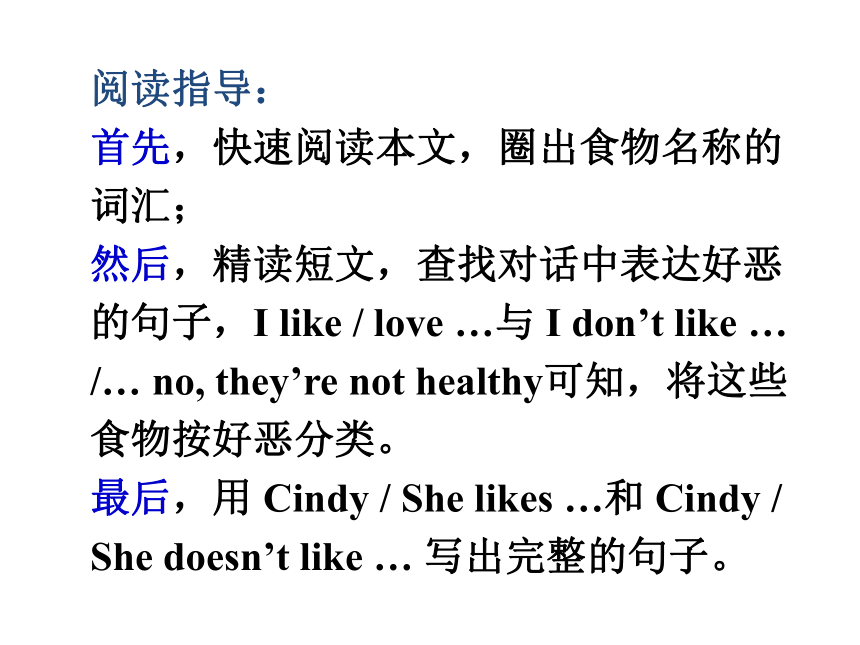
文档简介
课件34张PPT。Unit 6
Do you like bananas? Section B
2a----2cWhat do you have for your breakfast every day?What do you have for your lunch every day?What do you have for your supper every day? milk
applecarrotsfishorange hamburger
ice creamFrench frieshealthy foodunhealthy food2a Which food do you think is healthy? Check (√) Yes, Maybe or No.New Wordsstar [stɑ:] n.
eat ?[i:t] v.
well ?[wel] adv.
habit ?[?h?bit] n.
healthy ?[?helθi] adj.
really ?[?ri?li] adv.
question [?kwest?(?)n] n.
want [wɑ:nt] v.
be ?[bi:] v.
fat ?[f?t] adj.星星;明星
吃
好; 令人满意地
习惯
健康的
真正地
问题
需要;想要
变成
肥的;肥胖的2b Read the magazine article and circle the food words.Sports Star Eats Well!David asks the volleyball star, Cindy Smith, about her eating habits.
David: Hello, Cindy. What do you like for breakfast?
Cindy: I love fruit. I think it’s healthy.
David: OK. So what fruit do you like? Do you like bananas?
Cindy: Well, I don’t like bananas.
But I like oranges and apples.David: What about lunch? Do you like salad?
Cindy: Yes, I really like it.
David: Hmm ... and do you like hamburgers for dinner?
Cindy: Oh, no, they’re not healthy. I like chicken for dinner.
David: OK, well, one last question — do you eat
ice-cream after dinner?
Cindy: Err ... I like ice-cream ...
but I don’t eat it. I don’t want to be fat.2c Write five sentences about Cindy’s eating habits.Cindy likes healthy food.
Cindy _____________________________.
She _______________________________.
She _______________________________.
Cindy doesn’t ______________________.
She doesn’t _________________________.阅读指导:
首先,快速阅读本文,圈出食物名称的词汇;
然后,精读短文,查找对话中表达好恶的句子,I like / love …与 I don’t like … /… no, they’re not healthy可知,将这些食物按好恶分类。
最后,用 Cindy / She likes …和 Cindy / She doesn’t like … 写出完整的句子。 Cindy likes healthy food.
1. Cindy _______________________________
2. She _________________________________
3. She _________________________________
4. Cindy doesn’t ________________________
5. She doesn’t __________________________2cLet’s check the questions. loves fruit.eat ice-cream after dinner.likes oranges and apples.likes salad for lunch. like hamburgers for dinner.1. Sports star eats well! 体育明星吃得好!
句中的well用作副词,意为 “好”,用来修饰动词eat,意为“吃得好”。例如:
Peter eats very well at school.
彼得在学校里吃得很好。ExplanationTom likes basketball. He plays it very well.
汤姆喜欢篮球。他打得很好。 (1) good 是形容词,常置于名词之前,表示 “好的”。
Mr. Wang is a good teacher.
王老师是一位好老师。
(2) well用作副词,常置于动词之后,表示 程度“好;满意地”;用作形容词指“身 体好”。如: well 与 good The boy can swim very well.
这个男孩游泳游得很好。
— How is your father? 你的爸爸挺好吗?
— He’s very well. 他很好的。
2. eating habits 饮食习惯
eating habits 意为“饮食习惯”,其中eating是动名词作定语,修饰habits。类似短语还有: swimming pool 游泳池
reading room 阅览室 have和eat作动词时, 都有“吃”的意思。
have除表示“吃”以外, 还可以表示“喝;吸”, 而eat只表示“吃”。
have常用在一日三餐前, 即have breakfast / lunch / supper (吃早饭/ 午饭/ 晚饭), have dinner (吃正餐)。
have表示“吃”, 用在具体食物名词之前时可与eat互换。
注意: have 的单三形式为has; eat的单三形式为eats。 Jeff and Betty have breakfast at school. ???? 杰夫和贝蒂在学校吃早饭。
Do you like to have some ice cream? ???? 你想吃些冰淇淋吗?
His little brother likes to eat bananas. ???? 他的小弟弟喜欢吃香蕉。
除了have和eat之外, take也有“吃”的意思,但take多用来表示吃药:take the medicine用have或eat的适当形式填空。
1). He usually _____ (have) supper at six o’clock.
2). In Japan, people like to _____ (eat) fish.
3). Please _____ (have) an orange.
4). He _____ (eat) strawberries for dessert.haseathaveeats3. healthy 是形容词“健康的”,其名词形式为health“健康”。例如:
Tom eats lots of healthy food.
汤姆吃许多健康的食品。
It’s good for your health.
这对你的健康有好处。4. I like chicken for dinner.
晚饭我喜欢鸡肉。
“like + 食品名词 + for + 某餐”表示“某人 喜欢吃什么”。如: — What do you like for dinner?
晚饭你喜欢吃什么?
— I like vegetables and rice for dinner.
午饭我喜欢蔬菜和米饭。
She likes bread and milk for breakfast.
早餐他喜欢牛奶和面包。
5. for 作介词,表示“对于……,就……而言”。for breakfast / lunch / dinner
就早餐/午餐而言like句式解析
★肯定句式:
实义动词like的一般现在时的肯定句式为“主语+ like + 宾语”。当主语为第一、二人称或复数人称时, like用动词原形;当主语为he、she等单数第三人称时, like应变为第三人称单数形式, 即likes。
I like hamburgers. 我喜欢吃汉堡包。
She likes vegetables. 她喜欢吃蔬菜。★否定句式
实义动词like的一般现在时的否定句式为“主语+ don’t / doesn’t like + 宾语”。当主语为第一、二人称或复数人称时, like前面须加助动词don’t;当主语为he, she等单数第三人称时, likes前面须加助动词doesn’t, 同时将likes变为like。
I don’t like hamburgers. 我不喜欢吃汉堡包。
She doesn’t like vegetables. 她不喜欢吃蔬菜。★一般疑问句式
I like hamburgers. →
—Do you like hamburgers? ???? 你喜欢吃汉堡包吗?
—Yes, I do. / No, I don’t. ???? 是的,我喜欢吃。/ 不, 我不喜欢吃。
She likes vegetables. →
—Does she like vegetables? ???? 她喜欢吃蔬菜吗?
—Yes, she does. / No, she doesn’t.
是的,她喜欢吃。/ 不, 她不喜欢吃。like为实义动词时, 其一般现在时的一般疑问句式为“Do / Does + 主语+ like + 宾语?”。
当主语为一、二人称或复数人称时, 句首助动词用Do;其肯定、否定回答分别为“Yes, ... do. / No, ... don’t.”。
当主语为he, she等单数第三人称时, 句首用助动词Does, 同时将likes变为like, 其他语序不变;其肯定、否定回答分别为“Yes, ... does. / No, ... doesn’t.”。[即学即练]
按要求改写下列句子,每空一词。
1). They like bananas. (改为否定句)
They ______ ______ bananas.
2). I like to eat vegetables every day. (改为一般疑问句)
______ you like to ______ vegetables every day? don’t likeDo eat3). Tom likes apples.(改为一般疑问句)
______ Tom ______ apples?
4). Does he like fried food?(作肯定回答)
______, he ______.
5). Do they like hamburgers?(作否定回答)
______, they ______. Does likeYes doesNo don’t6. I don’t want to be fat. 我不想变胖。
want 用作动词,意为“要;想要”,其常见 用法如下: want sth.
想要某物
want to do sth.
想要去做某事
want sb. to do sth.
想要某人去做某事I want some rice.
我想要些米饭。
She wants to ask a question.
她想问个问题。
Jack wants me to go to school with him.
杰克想让我和他一起去上学。 7. really adv. 真正地 主要用于强调与事实或现实不相违背,也可表示不快、惊奇或某种含蓄的怀疑。It’s really cold today.
今天可真冷。Did he really say so?
他真的那样说吗?8. question n. 问题 answer the question 回答这个问题通常指用口头或书面提出来要求回答或有待讨论解决的问题。After answering his question, she asked back.
回答他的问题之后,她反问他。Do you like hamburgers?
Yes, ____ ____. But I _____ ______apples.2. I’m Mary. I like ice cream. I don’t like salad.— Hi, Mary. ________________________?
— Yes, I do.
— Do you like salad?
— ____________.Exercise I dodon’tlikeDo you like ice creamNo, I don’t3. — Does Tom like broccoli?
— _____, ____ _______. But Rose does.4. My mother ______salad. But I don’t like. (like)5. Do you like ___________? (strawberry)6. She _______ like ice cream.7. They like hamburgers.(一般疑问句)Nohedoesn’tlikesstrawberriesdoesn’tDo they like hamburgers?homeworkAsk what your parents eat every day and talk about whether it is healthy or not.
Do you like bananas? Section B
2a----2cWhat do you have for your breakfast every day?What do you have for your lunch every day?What do you have for your supper every day? milk
applecarrotsfishorange hamburger
ice creamFrench frieshealthy foodunhealthy food2a Which food do you think is healthy? Check (√) Yes, Maybe or No.New Wordsstar [stɑ:] n.
eat ?[i:t] v.
well ?[wel] adv.
habit ?[?h?bit] n.
healthy ?[?helθi] adj.
really ?[?ri?li] adv.
question [?kwest?(?)n] n.
want [wɑ:nt] v.
be ?[bi:] v.
fat ?[f?t] adj.星星;明星
吃
好; 令人满意地
习惯
健康的
真正地
问题
需要;想要
变成
肥的;肥胖的2b Read the magazine article and circle the food words.Sports Star Eats Well!David asks the volleyball star, Cindy Smith, about her eating habits.
David: Hello, Cindy. What do you like for breakfast?
Cindy: I love fruit. I think it’s healthy.
David: OK. So what fruit do you like? Do you like bananas?
Cindy: Well, I don’t like bananas.
But I like oranges and apples.David: What about lunch? Do you like salad?
Cindy: Yes, I really like it.
David: Hmm ... and do you like hamburgers for dinner?
Cindy: Oh, no, they’re not healthy. I like chicken for dinner.
David: OK, well, one last question — do you eat
ice-cream after dinner?
Cindy: Err ... I like ice-cream ...
but I don’t eat it. I don’t want to be fat.2c Write five sentences about Cindy’s eating habits.Cindy likes healthy food.
Cindy _____________________________.
She _______________________________.
She _______________________________.
Cindy doesn’t ______________________.
She doesn’t _________________________.阅读指导:
首先,快速阅读本文,圈出食物名称的词汇;
然后,精读短文,查找对话中表达好恶的句子,I like / love …与 I don’t like … /… no, they’re not healthy可知,将这些食物按好恶分类。
最后,用 Cindy / She likes …和 Cindy / She doesn’t like … 写出完整的句子。 Cindy likes healthy food.
1. Cindy _______________________________
2. She _________________________________
3. She _________________________________
4. Cindy doesn’t ________________________
5. She doesn’t __________________________2cLet’s check the questions. loves fruit.eat ice-cream after dinner.likes oranges and apples.likes salad for lunch. like hamburgers for dinner.1. Sports star eats well! 体育明星吃得好!
句中的well用作副词,意为 “好”,用来修饰动词eat,意为“吃得好”。例如:
Peter eats very well at school.
彼得在学校里吃得很好。ExplanationTom likes basketball. He plays it very well.
汤姆喜欢篮球。他打得很好。 (1) good 是形容词,常置于名词之前,表示 “好的”。
Mr. Wang is a good teacher.
王老师是一位好老师。
(2) well用作副词,常置于动词之后,表示 程度“好;满意地”;用作形容词指“身 体好”。如: well 与 good The boy can swim very well.
这个男孩游泳游得很好。
— How is your father? 你的爸爸挺好吗?
— He’s very well. 他很好的。
2. eating habits 饮食习惯
eating habits 意为“饮食习惯”,其中eating是动名词作定语,修饰habits。类似短语还有: swimming pool 游泳池
reading room 阅览室 have和eat作动词时, 都有“吃”的意思。
have除表示“吃”以外, 还可以表示“喝;吸”, 而eat只表示“吃”。
have常用在一日三餐前, 即have breakfast / lunch / supper (吃早饭/ 午饭/ 晚饭), have dinner (吃正餐)。
have表示“吃”, 用在具体食物名词之前时可与eat互换。
注意: have 的单三形式为has; eat的单三形式为eats。 Jeff and Betty have breakfast at school. ???? 杰夫和贝蒂在学校吃早饭。
Do you like to have some ice cream? ???? 你想吃些冰淇淋吗?
His little brother likes to eat bananas. ???? 他的小弟弟喜欢吃香蕉。
除了have和eat之外, take也有“吃”的意思,但take多用来表示吃药:take the medicine用have或eat的适当形式填空。
1). He usually _____ (have) supper at six o’clock.
2). In Japan, people like to _____ (eat) fish.
3). Please _____ (have) an orange.
4). He _____ (eat) strawberries for dessert.haseathaveeats3. healthy 是形容词“健康的”,其名词形式为health“健康”。例如:
Tom eats lots of healthy food.
汤姆吃许多健康的食品。
It’s good for your health.
这对你的健康有好处。4. I like chicken for dinner.
晚饭我喜欢鸡肉。
“like + 食品名词 + for + 某餐”表示“某人 喜欢吃什么”。如: — What do you like for dinner?
晚饭你喜欢吃什么?
— I like vegetables and rice for dinner.
午饭我喜欢蔬菜和米饭。
She likes bread and milk for breakfast.
早餐他喜欢牛奶和面包。
5. for 作介词,表示“对于……,就……而言”。for breakfast / lunch / dinner
就早餐/午餐而言like句式解析
★肯定句式:
实义动词like的一般现在时的肯定句式为“主语+ like + 宾语”。当主语为第一、二人称或复数人称时, like用动词原形;当主语为he、she等单数第三人称时, like应变为第三人称单数形式, 即likes。
I like hamburgers. 我喜欢吃汉堡包。
She likes vegetables. 她喜欢吃蔬菜。★否定句式
实义动词like的一般现在时的否定句式为“主语+ don’t / doesn’t like + 宾语”。当主语为第一、二人称或复数人称时, like前面须加助动词don’t;当主语为he, she等单数第三人称时, likes前面须加助动词doesn’t, 同时将likes变为like。
I don’t like hamburgers. 我不喜欢吃汉堡包。
She doesn’t like vegetables. 她不喜欢吃蔬菜。★一般疑问句式
I like hamburgers. →
—Do you like hamburgers? ???? 你喜欢吃汉堡包吗?
—Yes, I do. / No, I don’t. ???? 是的,我喜欢吃。/ 不, 我不喜欢吃。
She likes vegetables. →
—Does she like vegetables? ???? 她喜欢吃蔬菜吗?
—Yes, she does. / No, she doesn’t.
是的,她喜欢吃。/ 不, 她不喜欢吃。like为实义动词时, 其一般现在时的一般疑问句式为“Do / Does + 主语+ like + 宾语?”。
当主语为一、二人称或复数人称时, 句首助动词用Do;其肯定、否定回答分别为“Yes, ... do. / No, ... don’t.”。
当主语为he, she等单数第三人称时, 句首用助动词Does, 同时将likes变为like, 其他语序不变;其肯定、否定回答分别为“Yes, ... does. / No, ... doesn’t.”。[即学即练]
按要求改写下列句子,每空一词。
1). They like bananas. (改为否定句)
They ______ ______ bananas.
2). I like to eat vegetables every day. (改为一般疑问句)
______ you like to ______ vegetables every day? don’t likeDo eat3). Tom likes apples.(改为一般疑问句)
______ Tom ______ apples?
4). Does he like fried food?(作肯定回答)
______, he ______.
5). Do they like hamburgers?(作否定回答)
______, they ______. Does likeYes doesNo don’t6. I don’t want to be fat. 我不想变胖。
want 用作动词,意为“要;想要”,其常见 用法如下: want sth.
想要某物
want to do sth.
想要去做某事
want sb. to do sth.
想要某人去做某事I want some rice.
我想要些米饭。
She wants to ask a question.
她想问个问题。
Jack wants me to go to school with him.
杰克想让我和他一起去上学。 7. really adv. 真正地 主要用于强调与事实或现实不相违背,也可表示不快、惊奇或某种含蓄的怀疑。It’s really cold today.
今天可真冷。Did he really say so?
他真的那样说吗?8. question n. 问题 answer the question 回答这个问题通常指用口头或书面提出来要求回答或有待讨论解决的问题。After answering his question, she asked back.
回答他的问题之后,她反问他。Do you like hamburgers?
Yes, ____ ____. But I _____ ______apples.2. I’m Mary. I like ice cream. I don’t like salad.— Hi, Mary. ________________________?
— Yes, I do.
— Do you like salad?
— ____________.Exercise I dodon’tlikeDo you like ice creamNo, I don’t3. — Does Tom like broccoli?
— _____, ____ _______. But Rose does.4. My mother ______salad. But I don’t like. (like)5. Do you like ___________? (strawberry)6. She _______ like ice cream.7. They like hamburgers.(一般疑问句)Nohedoesn’tlikesstrawberriesdoesn’tDo they like hamburgers?homeworkAsk what your parents eat every day and talk about whether it is healthy or not.
同课章节目录
- starters 预备篇(2012秋审查)
- Unit 1 Good morning !
- Unit 2 What’s this in English?
- Unit 3 What color is it ?
- Unit 1 My name's Gina.
- Section A
- Section B
- Unit 2 This is my sister.
- Section A
- Section B
- Unit 3 Is this your pencil?
- Section A
- Section B
- Unit 4 Where's my schoolbag?
- Section A
- Section B
- Unit 5 Do you have a soccer ball?
- Section A
- Section B
- Unit 6 Do you like bananas?
- Section A
- Section B
- Unit 7 How much are these socks?
- Section A
- Section B
- Unit 8 When is your birthday?
- Section A
- Section B
- Unit 9 My favorite subject is science.
- Section A
- Section B
